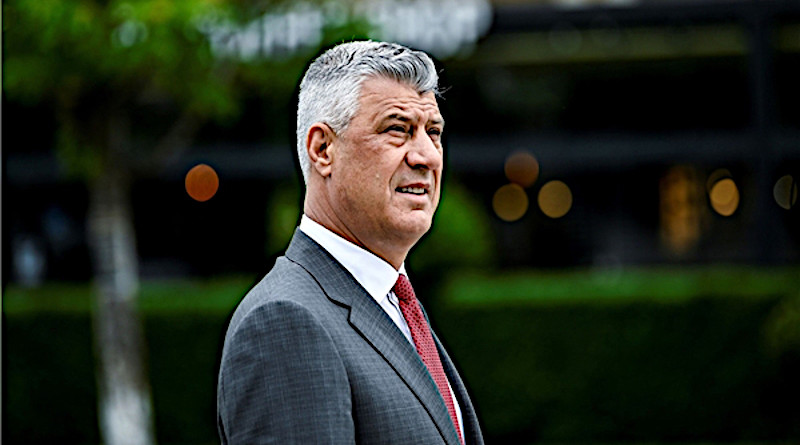Kosovo Needs An Election – OpEd
Hashim Thaci’s indictment blows apart the politically-motivated diplomacy of the last few months.
By David B. Kanin*
The fix was in. Thaci and Isa Mustafa had made their deal to hijack Kosovo’s politics, eject Albin Kurti from the job he won in the last election, and strike a deal with Belgrade that would be awful for Kosovo but great for their overlapping political ambitions. Thaci and Avdullah Hoti, the pliant Prime Minister chosen by the political bosses, would permit an aggressive American envoy to orchestrate a result having much more to do with US politics than with the interests of those Kosovars willing to play the role of Washington’s clients. The result would join the Dayton Agreement and UN Security Council Resolution 1244 as signal triumphs for Serbian diplomacy.
Then the international court created to investigate war crimes allegedly committed by former members of the Kosovo Liberation Army decided to haul Thaci into the dock before he could have another controversial conversation with his pal, Aleksandar Vucic. This action made a sort of logical sense. All parties to the meeting supposed to be held in Washington on June 27 were acting in their parochial interests. Why should the Court give up an opportunity to answer criticism that it – like the plodding international tribunal on war crimes in the former Yugoslavia – was largely engaged in time-consuming choreography sure to result in a poor performance?
The muted response from Pristina, Belgrade, and Washington suggested the Court played this well. No one was going to attack the sanctity of what passes for a legal process. Even an American administration that has been more than a little skeptical of any political, diplomatic, commercial, and legal activities not made in America saw no reason to overreact to an event of miniscule importance to American domestic politics. Vucic did not really need the meeting in the first place. He could bask in the spotlight provided by PR opportunities in Moscow and Brussels
And the tattered Kosovar leadership had nowhere to go. The effort to craft a deal with Vucic marked Thaci’s all-out effort to remain relevant in Kosovo’s politics beyond the end of his term as President. For his part, Mustafa would have drawn even with Thaci as a political fixer, and would have used that status to attempt to become even more powerful after Thaci left office. In Kosovo, like many other countries, such institutions as constitutions, political parties, and parliaments matter much less than the personal performances and trust-based reputations of individual power figures. A deal with Serbia blessed by the Americans would trump the parliamentary arithmetic that had produced Hoti’s forgettable government.
Hoti’s decision not to go to Washington on June 27th – in the face of an initial US claim that he would – also was a predictable afterthought. There is no way he could play in the big sandbox without adult supervision.
Kosovo dodged a bullet. Vucic had made clear he would not agree to recognize Kosovo – and the other parties made no effort to make him do so. A possible deal whereby Kosovo would remove Ramush Haradinaj’s tariffs in exchange for Belgrade’s agreement to suspend its effort to convince countries that have recognized Kosovo to un-recognize it would have done nothing to solve the dispute over Kosovo’s stunted sovereignty. If Serbia had thrown in the sweetener of withdrawing its opposition to Kosovar membership in international organizations the deal still would have been bad for Pristina.
Even a UN General Assembly seat would do a less than universally recognized Kosovo as little good as membership on the UN Security Council did for Taiwan, which was never able to shake off its status as part of China.
Kosovo’s attention now needs to shift home. Thaci remains President for now, but his legal problems will not do for him what multiple trials on war crimes charges did for Haradinaj. Although Albanians in Kosovo and the rest of the Albanian universe are rallying to his defense and to the defense of other former KLA fighters caught up in the Court’s net, Thaci is unlikely to stem his political decline. Younger people are impatient to replace the wartime generation in his and the country’s other patronage networks/political parties.
Despite his government’s ouster, Kurti and Vetevendosje retain a likely plurality of popular support. During his short stint as Prime Minister, Kurti placed a proper focus on Kosovo’s sovereignty. He proved he was more likely than his political opponents to avoid the mistake of accepting a quick deal engineered by Washington or the EU’s demand that Kosovo knuckle under to its insistence on a weak-tea ”normalization” that would push off both the sovereignty issue and the empty promise that Kosovo might someday join “Europe.”
Mustafa is going to attempt to keep Hoti in office long enough for Mustafa to figure out his next move. A deal with Haradinaj is possible if the two men can decide how they both can benefit like Thaci and Musatafa planned to. The first thing they will have to do is undermine Albin Kurti and Vetevendosje.
This should not be allowed to happen. Kurti had demanded a new election before the shaky Hoti government came into office and is well within his rights to demand one now that Thaci has been indicted. The last democratic test in Kosovo put Kurti and his party at the top of the political heap, and a new one should decide if he should return there. If so, he should once again be Prime Minister. If not, then Kosovo will see where its people – not just a couple political bosses – want it to be.
*David B. Kanin is an adjunct professor of international relations at Johns Hopkins University and a former senior intelligence analyst for the Central Intelligence Agency (CIA).
The views expressed in this article do not necessarily reflect those of TransConflict.

